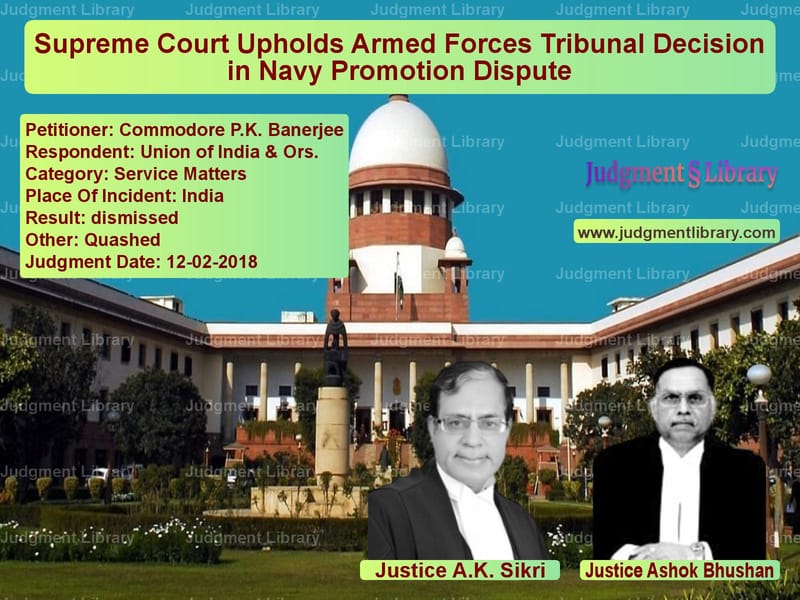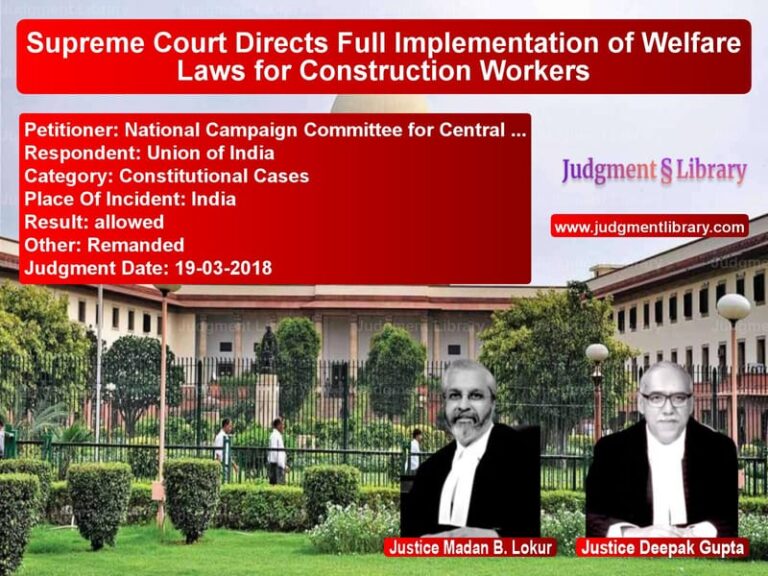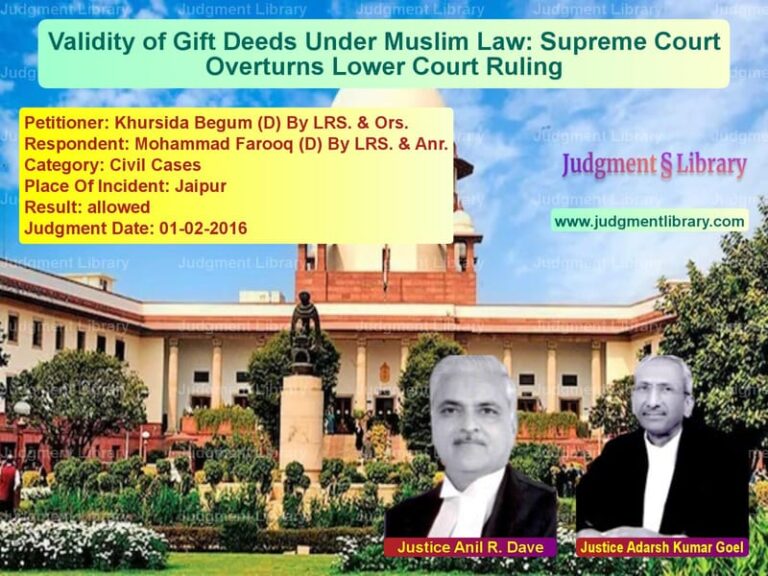Supreme Court Upholds Armed Forces Tribunal Decision in Navy Promotion Dispute
The Supreme Court of India, in its judgment in Commodore P.K. Banerjee vs. Union of India & Ors., addressed a crucial dispute regarding the Annual Confidential Reports (ACRs) of a naval officer and their impact on his promotion to the rank of Rear Admiral. The Court upheld the decision of the Armed Forces Tribunal (AFT), which had granted partial relief by expunging adverse remarks in one ACR but denied further relief related to his overall career profile.
Background of the Case
The appellant, Commodore P.K. Banerjee, served in the Indian Navy and had an impressive career, having commanded some of the most prestigious warships. However, he alleged that uncommunicated adverse remarks in his 2007–2008 ACR severely impacted his promotion to Rear Admiral. These remarks, according to him, resulted in a cascading effect on his future evaluations, ultimately affecting his merit ranking.
The case progressed as follows:
- The Armed Forces Tribunal (AFT) dismissed his challenge to his overall performance grading but agreed to expunge the adverse remarks in his ACR for the period 2007–2008.
- Despite this, the AFT ruled that the adverse remarks did not have a significant impact on his promotion and denied his request for reconsideration of his promotion.
- The appellant approached the Supreme Court of India challenging the AFT’s decision.
Key Legal Issues Considered
- Whether the adverse remarks recorded in the appellant’s ACR for 2007–2008 affected his subsequent ACRs and promotion prospects.
- Whether the Armed Forces Tribunal (AFT) erred in holding that the adverse remarks did not have a cascading effect on his career.
- Whether the Navy’s Performance Appraisal Review Board (PARB) system fairly moderated his ACR ratings.
Arguments by the Appellant (Commodore P.K. Banerjee)
- The adverse remarks given in his ACR for 2007–2008 were unfair, uncommunicated, and had a direct negative impact on his future ACRs.
- Despite having an outstanding career, his numerical gradings were consistently downgraded by superior officers based on the initial adverse remarks.
- He was placed at the top of his batch in 2007, but his merit ranking dropped after the 2008 ACR, affecting his selection for Rear Admiral.
- The Performance Appraisal Review Board (PARB) system was used to justify downgrading his ACRs without proper assessment of his actual performance.
Arguments by the Respondents (Union of India & Ors.)
- The adverse remarks in the 2007–2008 ACR had already been expunged and did not affect subsequent reports.
- The appellant’s lower merit ranking was due to his overall performance, and not solely because of one ACR.
- The PARB system was fairly applied to maintain uniformity in assessments and prevent exaggerated ratings.
- The appellant was considered for promotion multiple times but was not selected based on comparative merit.
Supreme Court’s Observations
The Supreme Court reviewed the appellant’s performance records and noted:
“The adverse remarks for 2007–2008 have already been expunged, and the AFT has rightly observed that there was no cascading effect on his later ACRs.”
The Court further emphasized:
“The appellant’s contention that he was unfairly denied promotion is not supported by sufficient evidence. The merit ranking system and moderation by the PARB were applied consistently.”
Final Judgment and Directions
- The Supreme Court dismissed the appeal, affirming the AFT’s decision.
- The Court upheld the expunging of adverse remarks for 2007–2008 but ruled that it did not warrant a revision of later ACRs.
- The Court found no reason to interfere with the Navy’s decision regarding the appellant’s promotion.
- However, the Court urged the Navy to consider the officer’s overall record and ensure that his contributions were given due recognition in future postings and opportunities.
Implications of the Judgment
This ruling has significant implications for performance evaluations and promotions in the armed forces:
- Fair Appraisal Process: Officers must be informed of adverse remarks in ACRs so that they have an opportunity to respond.
- Limited Scope for Challenging ACRs: Once adverse remarks are expunged, they do not automatically invalidate subsequent performance evaluations.
- Promotion Boards Have Final Say: The judgment reinforces that promotion decisions are based on overall merit rather than isolated complaints about specific ACRs.
- Judicial Review Has Limits: Courts will not interfere with military promotion decisions unless there is clear evidence of bias or procedural irregularities.
Conclusion
The Supreme Court’s ruling in this case upholds the principle that military officers are subject to rigorous performance assessments, and promotions are granted based on a holistic evaluation of their careers. While the appellant’s grievance about adverse remarks was acknowledged and rectified, his broader claims about unfair promotion denial were not substantiated. This judgment provides clarity on how ACRs and promotion assessments are handled in the armed forces.
Petitioner Name: Commodore P.K. BanerjeeRespondent Name: Union of India & Ors.Judgment By: Justice A.K. Sikri, Justice Ashok BhushanJudgment Date: 12-02-2018
Don’t miss out on the full details! Download the complete judgment in PDF format below and gain valuable insights instantly!
Download Judgment: Commodore P.K. Baner vs Union of India & Ors Supreme Court of India Judgment Dated 12-02-2018.pdf
Direct Downlaod Judgment: Direct downlaod this Judgment
See all petitions in Promotion Cases
See all petitions in Public Sector Employees
See all petitions in Employment Disputes
See all petitions in Judgment by A.K. Sikri
See all petitions in Judgment by Ashok Bhushan
See all petitions in dismissed
See all petitions in Quashed
See all petitions in supreme court of India judgments February 2018
See all petitions in 2018 judgments
See all posts in Service Matters Category
See all allowed petitions in Service Matters Category
See all Dismissed petitions in Service Matters Category
See all partially allowed petitions in Service Matters Category







